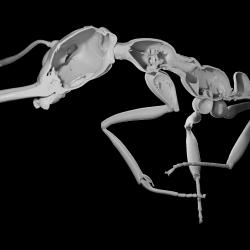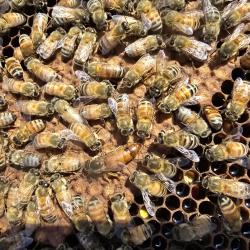Leslie Pick Named Associate Dean for Graduate Education in UMD’s College of Computer, Mathematical, and Natural Sciences
Leslie Pick has been named associate dean for graduate education in the University of Maryland’s College of Computer, Mathematical, and Natural Sciences (CMNS), effective May 1, 2025. She is a professor in the Department of Entomology and served as its chair from 2013 to 2024.

Pick joined UMD in 2003 as an associate professor, following 13 years as an assistant and associate professor at the Mount Sinai School of Medicine. She also served as director of UMD’s Molecular and Cell Biology Graduate Program (2004-08) and program director of the National Science Foundation’s Division of Integrated Organismal Sciences (2012-13).
“The associate dean for graduate education provides critical contributions to the college’s executive cabinet,” said CMNS Dean Amitabh Varshney. “Leslie’s strong leadership qualities and experience will be an asset, and I am confident she will build on CMNS’s strong reputation in graduate education in her new role.”
As CMNS associate dean for graduate education, Pick will coordinate the college’s 24 graduate degree programs, which educate more than 2,100 students annually, and review proposals for new graduate courses and programs. She will also oversee the Science Academy, which offers graduate certificates and M.S. programs for working professionals in four areas: applied machine learning, bioinformatics and computational biology, data science, and quantum computing.
She will also work closely with the college’s leadership team, department chairs, research institute and center directors, and graduate program directors to enhance graduate student teaching, learning and mentoring activities in the college.
“Throughout my career, graduate student training has always been a priority,” Pick said. “In my new role as associate dean, I look forward to building upon my experience to enhance the quality of our graduate programs in CMNS, ensuring scientific stringency and critical thinking, expanding our portfolio of extramural training grants, and, critical to all endeavors, fostering excellence in mentorship.”
Pick’s research lab has been continuously funded for over 30 years, she maintains an active National Institutes of Health-funded research program and she has published over 75 peer-reviewed journal articles and book chapters. She has mentored undergraduate students, graduate students, postdoctoral fellows and research technicians in her lab and has taught genetics and professional development classes at the undergraduate and graduate levels.
In her research, Pick uses insects as model systems to study the regulatory genes and pathways that control embryonic development. Her lab members have developed genetic tools for a range of insect model systems to dissect the evolution of gene networks that control the formation of insect body segments—the defining feature of the insect body plan. Surprisingly, this work has shown that although segmentation is shared by all insects, the genes controlling this process vary in different insect species.
Examining the genetic control of segmentation in different insect species, Pick’s lab found multiple examples of gain, loss and change in function of critical regulatory genes. Most recently, in a paper published in Science Advances in 2024, her lab showed that milkweed bugs use a different set of genes to promote segment formation than fruit flies, the most extensively studied model insect.
"Our work shows that in nature, animals have been able to thrive despite major changes in regulatory genes that are critical for survival. We helped challenge the classic idea that if animals share a characteristic, they get there through the same genetic pathways," Pick said. "This work also shows that organisms are even more diverse than their external features reveal. Even for a shared feature such as segmentation, the genes controlling it may be wholly different in different species—an invisible layer of biodiversity in animal systems.”
Pick is an elected Fellow of the Entomological Society of America and the American Association for the Advancement of Science, was named a Distinguished Scholar-Teacher at UMD, and received the Pan-American Society for Evolutionary Developmental Biology’s Rudolf A. Raff Pioneers Award. She served as president of the Pan-American Society for Evolutionary Developmental Biology and maintains a role as past president.
As chair of the Department of Entomology, Pick oversaw the department’s Ph.D. program and traditional and online master’s programs. During her tenure, she hired 10 faculty members, including seven women, oversaw the promotions of 12 faculty members, and emphasized the professional development and career trajectories of staff members. She led the development of a new entomology minor and the expansion of the departmental undergraduate honors program.
Pick also supported the Entomology Student Organization and Bug Club, created an award that recognizes the importance of graduate students serving as mentors, continued the department’s successful Maryland Day exhibits and summer Bug Camp for kids, and expanded the Insect Zoo, among other accomplishments.
Pick earned her bachelor’s degree in psychology and biology from Wesleyan University in 1977 and her Ph.D. from Albert Einstein College of Medicine in 1986.
Pick assumes the associate dean role from Chemistry and Biochemistry Professor John Fourkas, who has held the position since January 2023. During his tenure, Fourkas met regularly with the CMNS Graduate Student Council, advocated for CMNS during the development of new Graduate School policies, and helped guide the college’s graduate programs through a challenging and fast-changing admissions cycle this year. In addition, the Science Academy launched new graduate certificate and master’s programs in quantum computing and converted all of its master’s programs from M.P.S. to M.S. degrees, which allows graduates to apply for the STEM Optional Practical Training (OPT) extension. Fourkas will continue in his role as CMNS associate dean for faculty affairs.







